Is it harmful to the body for a long time?
Author:Tencent Medical Code Time:2022.06.17
The emergence of detergent has brought great convenience to the dishes, but many people think that using dishwashing dishes will remain on the bowl, which is harmful to the human body.
So, is this kind of concerns true?
Let's talk about the conclusion first. As long as we use regular products, the tableware is rinsed clean, so don't worry.
If you are really worried, you can look at what "chemical composition" in the detergent of the detergent--
Usually, the detergent we use in daily, mainly contains surface active agents (such as sodium alkyl, sodium alcohol ether sulfate, etc.), flavors and pigments [1].

(Source: Shenzhen Consumer Council)
Among them, flavors and pigments make the detergent smell well and look good.
The surfactant is the ingredients with the highest content in the detergent (except water), and it is also the secret of washing the bowl.
We all know that water and oil are originally insoluble.
However, the surfactant is "good" with oil and water. It can make bubbles and let them "fuse".

(Source: Network)
In this way, the stubborn oil stains on the plate become easily cleaned by the water.
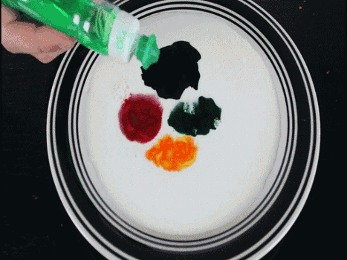
(Source: Giphy)
And people's concerns about detergent also come from "surfactants".
In fact, you can rest assured.
First of all, there are many types of surfactants, but only a few groups have been used for security verification after testing and practical use for many years.
Some studies have shown that taking surfactants poisoning, each kilogram of weight needs to be eaten about 8g surfactant.
For roughly, a person weighing 60kg needs to drink at least a large barrel of non -diluted detergent to a poisoning reaction [2].
Looking at it, it is equivalent to this toxic dose.
In addition, there is another heavy insurance--
Our country has strict regulations and standards for the safety of detergent and product quality, including the amount of residues that everyone is worried about, and will also conduct regular spot checks.

(Source: Shenzhen Consumer Council)
In terms of security, the qualification rate of the testing in recent years is very high, approximately 100%.
If you are really worried, you can pay attention to diluting the dishwashing essence and rinse the tableware with water until you rub it with your hand to "squeak".
In this way, the residual amount of detergent is already minimal, so you can rest assured!
Of course, you have to buy regular and qualified products!
Faced with a variety of detergent products in the market, everyone should brighten their eyes:
Select the qualified products of a regular store, do not buy products produced by homemade or small workshops
Before buying, see if there is any conventional product information on the packaging
In particular, pay attention to see if the product is in line with "GB 14930.1-2015 Food Safety Standard detergent" (hereinafter referred to as "National Standard").

If it is a type A product, it can be used for cleaning food; Class B is not recommended to wash vegetables and fruits, which is only suitable for cleaning tableware [4].
Secondly, look at the sensory indicators. Before using the detergent, you can observe the detergent without odor, layered, suspended or precipitated. There should be no qualified products.
Zhimei summarized a form for everyone, you can save it and compare:


(There are no examples that are clearly marked)
Buying "food -grade" detergent carefully, such products may not be cost -effective
Many businesses now like to make "food -grade" gimmicks to promote detergent.

(Source: a shopping platform)
This may be to make everyone feel that the detergent is non -toxic and harmless, but in fact, according to my country's food safety law, whether it is Class A or Class B products is safe [5].
In other words, as long as you use regular detergent and rinse, you will not "poison". There is no need to spend a lot of money to buy "food -grade" gimmick products.
Finally, there are some details that are easy to ignore by using detergent--
1. Washing tableware
① Put on rubber gloves, although the common detergent on the market does not have obvious damage to the skin [2,3].
However, the hands often come into contact with the surfactant (washing dishes and laundry), which can easily cause the skin's skin to dry, and peeling may appear in autumn and winter;
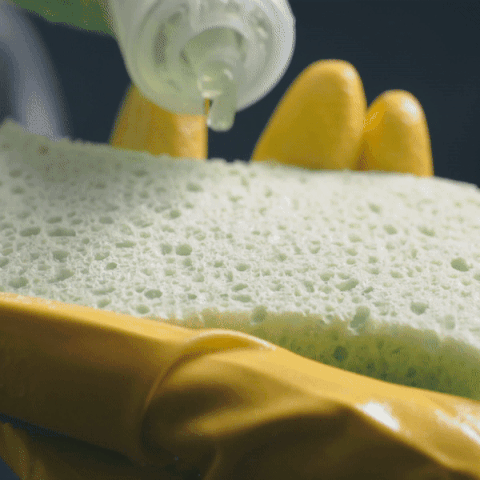
(Source: Giphy)
② Wash it as soon as possible after meals. If the oil dirt is heavier, it is recommended to wipe the food residue and oil with toilet paper first, and then soak it with hot water;
Then scrub a small amount of detergent on the wet sponge or rag, and then rinse it with flowing water.

(Source: Giphy)
2. Clean fruits and vegetables
① Use the detergent of Class A to meet the "Food Safety National Standard detergent".
② Rinse the dirt on the surface of the fruits and vegetables with water, and then add the detergent for 5 to 10 minutes.

(Source: Network)
③ The concentration of adding detergent at about 0.2%is appropriate (about a pot of water in a pot of common pots in the home with half a pump to a pump), or follow the instructions of the use of detergent.
④ After soaking, rinse with flowing water 2 to 3 times, and then choose and cut fruits and vegetables.
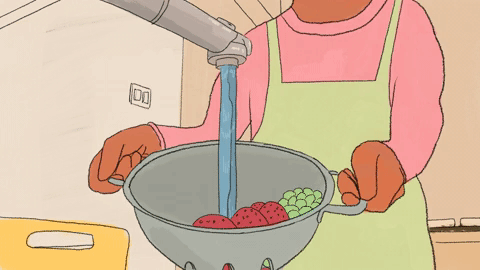
(Source: Giphy)
3. Do not add water to the detergent bottle
When the detergent is used quickly, many people will add tap water to it and make up for a while.
However, unless it is specially used to dilute the grid, it is not recommended to do this.
On the one hand, tap water will dilute the effective ingredients of the detergent, and the tap water may contain calcium ions, iron ions, etc., and a large amount of adding a large amount may affect the detergent of the detergent and cause the product cleaning capacity to decrease. On the other hand, tap water and hands are not sterile. During the water mixing process, bacteria or impurities are likely to pour in, so that the tableware and vegetables will "get the more dirty".
Having said so much, I feel that washing dishes is really troublesome, especially in winter ... I hope everyone will get rich and use the dishwasher (also including Zhimei me)!
(Source: Giphy)
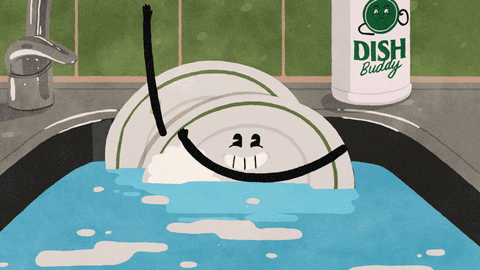
Review expert
Yun Wuxin | Doctor of Food Engineering, Department of Agriculture and Biological Engineering, Purdue University in the United States
references
[1] Smulders e, von rybinski w, sung e, et al. (2007). Laundry Detergets. In Ullmann's EncyClopedia of Industry Chemistry, (ed. )/Doi.org/102/14356007.14356007.14356007.14356356007.14356356007.14356007.14356357.
[2] Wu Kun, Zhang Xueming, Chen Bingqing. Research on the toxic test of cleaning detergent [J]. Journal of Harbin Medical University, 1987 (01): 51-53.
[3] Austoria AJ, Lakshmi C, Srinivas Cr, et al. IRritance Potential of 17 Detergets userd commonly by the indian house. Indian j dermatol venereol.
[4] "GB 14930.1-2015 Food Safety National Standard detergent" http://down.foodmate.net/standard/sort/3/48018.html
[5] "Food Safety Law of the People's Republic of China" http://www.scio.gov.cn/xwfbh/xwbfbh/wqfbh/20140530/xgzc30921/document/1371781/1371781.htmmmmm
*The content of this article is a science of health knowledge. It cannot be used as a specific diagnosis and treatment suggestion, nor can it replace the practice physician for face -to -face diagnosis, for reference only.
*The copyright of this article is owned by the Tencent Medical Code, and the media is prohibited from reprinting without authorization. The reprinting of illegal regulations will be investigated for legal responsibility in accordance with the law. Personal personnel are welcome to forward to the circle of friends.
- END -
What's wrong with the black line on the baby's nails?Is it tight?

The black line of the baby's nails is called nail -like black nails or longitudina...
Another License Out!East China Pharmaceutical Liculucan peptide is as soon as possible
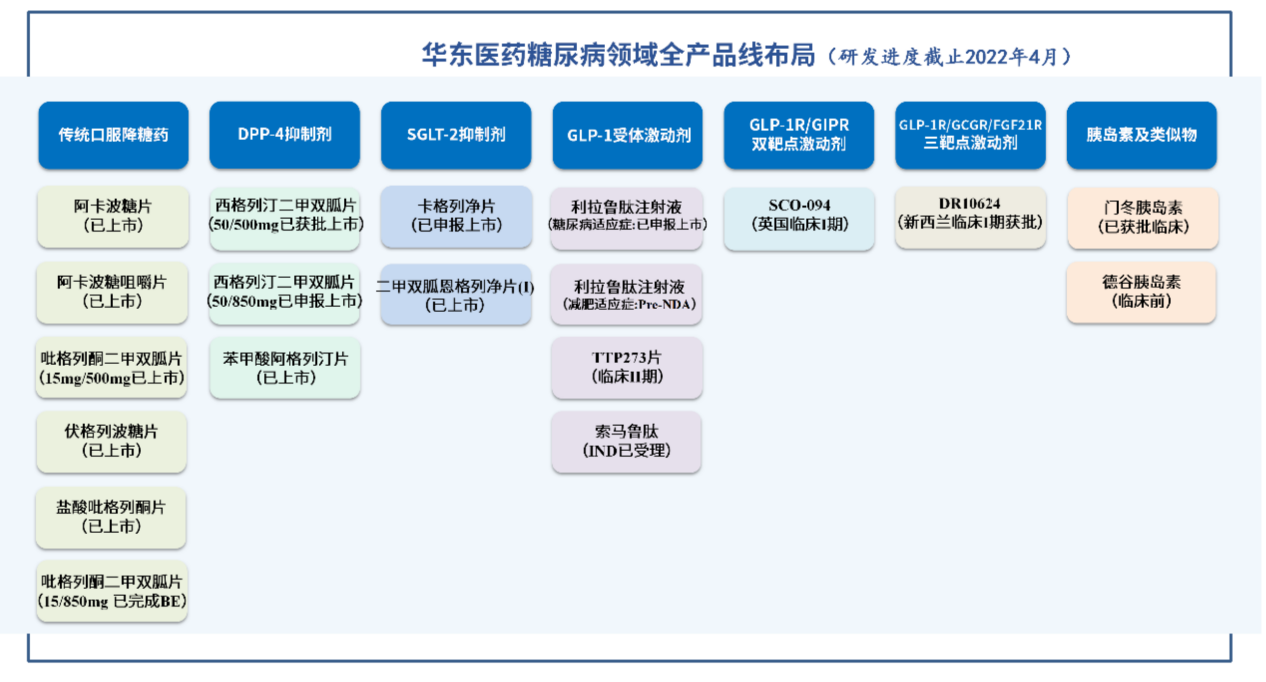
On June 23, East China Pharmaceutical (SZ.000963) announced that it would reach a ...